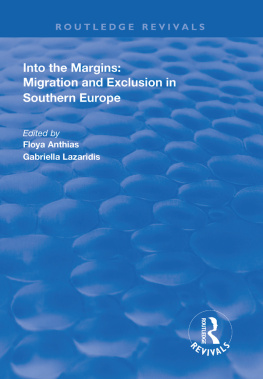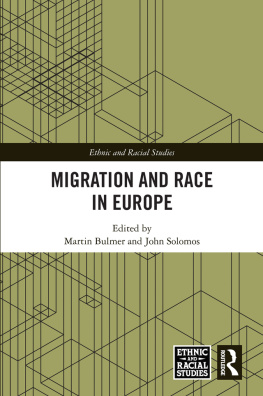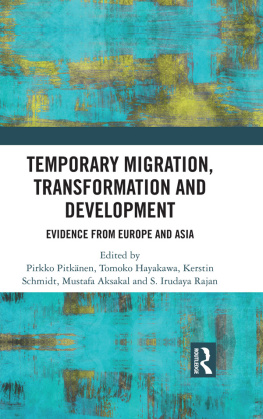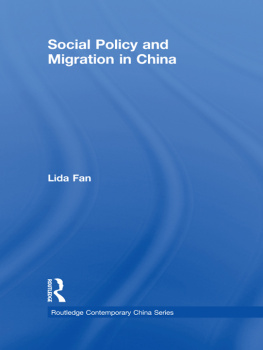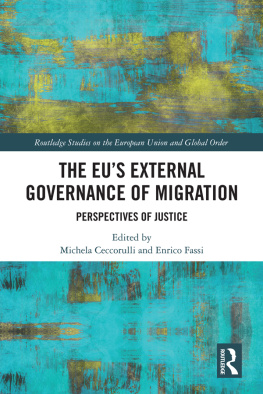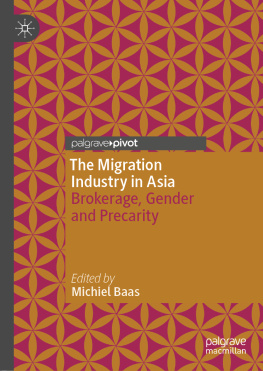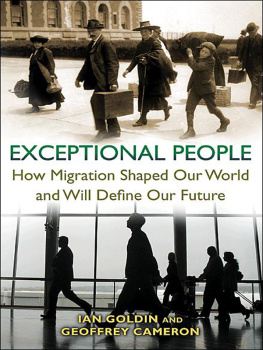The Migration Apparatus
SECURITY, LABOR, AND POLICYMAKING IN THE EUROPEAN UNION
Gregory Feldman
Stanford University Press
Stanford, California
Stanford University Press
Stanford, California
2012 by the Board of Trustees of the Leland Stanford Junior University. All rights reserved.
No part of this book may be reproduced or transmitted in any form or by any means, electronic or mechanical, including photocopying and recording, or in any information storage or retrieval system without the prior written permission of Stanford University Press.
Printed in the United States of America on acid-free, archival-quality paper
Library of Congress Cataloging-in-Publication Data
Feldman, Gregory, 1969- author.
The migration apparatus : security, labor, and policymaking in the European Union / Gregory Feldman.
pages cm
Includes bibliographical references and index.
ISBN 978-0-8047-6106-2 (cloth : alk. paper)--ISBN 978-0-8047-6107-9 (pbk. : alk. paper)--ISBN 978-0-8047-7912-8 (e-book)
1. European Union countries--Emigration and immigration--Government policy. 2. Foreign workers--Government policy--European Union countries. 3. Illegal aliens--Government policy--European Union countries. 4. Internal security--European Union countries. I. Title.
JV7590.F455 2011
325.4--dc23 2011023762
Typeset by Bruce Lundquist in 10/14 Minion
To Ilo and Uku. May your hearts always be this migrants home.
Most of what matters in our lives takes place in our absence...
Salman Rushdie,Midnights Children
CONTENTS
PREFACE
This book aims for two goals. The first goal is to capture how the European Unions emerging migration management apparatus interfaces with the contemporary global political and economic order. The books operative questions are how the apparatuss various parts articulate without a centralized authority, and how a normative policy subject is conjured up in its whirlwind of disparate policy processes. It focuses less on the questions of how well the apparatus works on the ground and whether migrants really conform to the demands pushed upon them. While crucially important, these questions do not necessarily point the investigator to the myriad routines of scattered technocrats whose work enables this apparatus, synergistically and perhaps unwittingly. Regardless of the degree of the apparatuss success, literally millions of migrants and travelers around the world must deal with its convergent strength, generated from the otherwise unrelated effects of external border control, biometric information technologies, and circular migration programs. Though large, it would be misleading to describe such a social construction as large-scale. This tag suggests that it rests loftily above real people and acts independently of them. It does neither. Rather, it results from the situated practices of technocrats, officials, and experts who often do not know each other and conduct much of their work virtually in cyberspace. If local rituals organize people by establishing direct connections between them, then apparatuses destroy those mechanisms, individualize people, and create indirect relations between them so that they, or their labor power, can be processed to an enormous degree. Grand moral statements make up for the social breakdown. They integrate policy experts, policy targets, and the apparatus that relates them into a common, if vacuous, ethical frame: A migration policy that works for everyone, as EU officials are known to say. Put starkly, however, the strange effect of this social situation is that there is no social in the substantive sense of the term.
The books second goal is to deploy a suitable ethnographic methodology for achieving the first goal. Like globalization, an apparatus poses obvious challenges to participant-observation, anthropologys signature field method, which was designed to map direct social and ecological connections. Ethnographers responses to the shattering of fixed place share a commitment to tracing tangible connections across the globe, establishing an in situ presence in as many nodal points as possible, and filling in the gaps with keen theoretical insights. This book offers a vital complement to these important responses: specifically, a methodology for studying highly mediated social relations and the veritable absence of connections between actors who are nevertheless absorbed in the same processes, though often from radically different positions. If alienation, estrangement, and objectification are hallmarks of mass capitalist society, then we should consider a nuanced understanding of connections as a methodological and theoretical construct. How do we study amorphous systems of population regulationunder which we all increasingly livethat rely on countless educated laborers who lack serious influence as particular individuals, ongoing ties to each other, and direct contact with the masses of people whom their labor indirectly regulates? I hope that what I call nonlocal ethnography will help us to examine how these (non)connections specifically take their shape, and their toll. It also acknowledges another hallmark of mass society, whether one is a poor Southern migrant or a wealthy Northern citizen, or any combination thereof: as we lack control over the most important conditions of our lives, so these conditions are rarely formulated in our midst. This point does not require us to abandon in situ field research, which places the ethnographer there in the actors midst. Rather, it requires us to continue to complicate how we identify and access the elusive there where we need to be to understand what made that actors midst possible.
ACKNOWLEDGMENTS
Producing this book quickly became both a great challenge and a sheer pleasure. Many people helped significantly with the former and hopefully shared with me in the latter. Of course, none of them share the blame for the pages that follow! I apologize if I have accidentally omitted any of their names below.
Michael Jandl played a crucial role in getting my fieldwork started. His colleagues and many others located at different places around the EU were extremely generous with their time, space, and attention. This book would not have materialized without their support. Many of these individuals appear in the book, though their names have been changed or left unmentioned for reasons of confidentiality. I hope that the final product wins their respect.
At various stages in the project, the manuscript benefited from the encouragement and feedback of Joe Heyman, Cris Shore, Susan Greenhalgh, Hugh Gusterson, Paul Silverstein, Bill Beeman, Don Brenneis, Paul Spoonley, Robert Rubinstein, Dan Hiebert, and Pablo Mendez. Alexia Bloch and Neil Guppy provided helpful comments on the grant proposal. At the University of California, Irvine, Susan Greenhalgh and her graduate Anthropology of Public Policy class (particularly Adonia Lugo, Connie McGuire, and Shaozeng Zhang) gave their class time and comments on a book chapter titled Illuminating the Apparatus: Steps Toward a Nonlocal Ethnography of Global Governance. That chapter appears in the edited volume Policy Worlds: Anthropology and the Anatomy of Contemporary Power, published by Berghahn Books ( 2011 ) and edited by Cris Shore, Susan Wright, and Davide Per. With permission of the publisher, parts of it also appear in of the present book.
Various pieces of the book were delivered as papers at different universities since 2005 . These include Brown Universitys Watson Institute for International Studies and Browns Working Group on Anthropology and Population in the Population Studies Training Center. I would like to thank Winifred Tate, Nicholas Townsend, Marida Hollos, Kay Warren, and Inna Leykin for invitations and stimulating discussions. During the workshop Migration in a Neoliberal Age, hosted by the University of Floridas Center for European Studies, I received helpful feedback from Maria Stoilkova, Monika Salzbrunn, Ayse Parla, Paul Silverstein, Cristiana Giordano, Laurie McIntosh, and Esther Romeyn. I thank Maria and Esther for the invitation to participate. I would also like to thank Ann-Cathrine Jungar at the Centre for Baltic and East European Studies at Sdertrns Hgskola, Stockholm, for hosting me as a visiting fellow, and Pat Cavendish for inviting me to deliver a keynote lecture for the Northeast International Education Association at Pierce College, Puyallup, Washington. Both opportunities offered useful input and engaging discussions, which further refined the present argument. At the University of British Columbia (UBC), the manuscript benefited from a number of workshops as well. These included the graduate student methods seminar in the Department of Geography; the research methods colloquium sponsored by the Interdisciplinary Studies Graduate Program; and Catherine Dauvergnes law workshop on Challenging Sovereignty.
Next page

